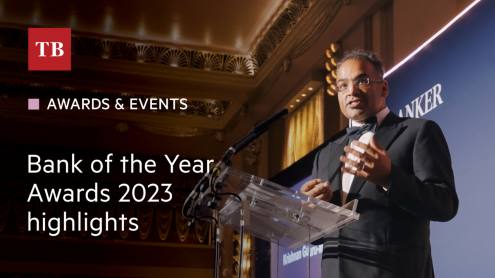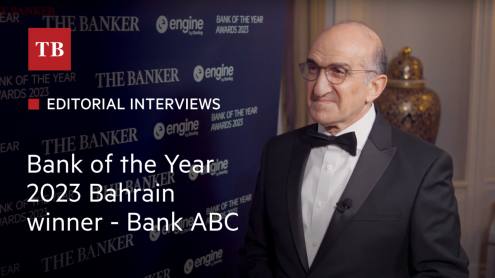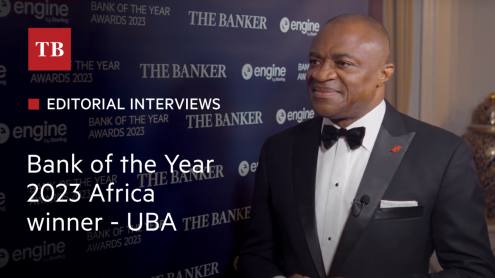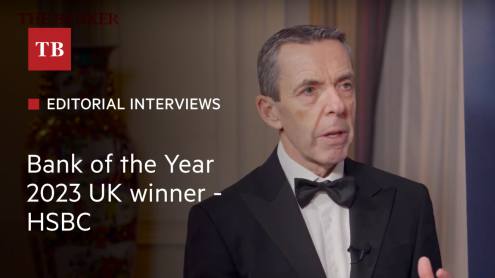Bond House of the Year
Morgan Stanley Morgan Stanley has long been a leader in the debt market for both corporates and financial institutions. Central to this leadership has been an ability to innovate and to advise on, develop and execute a wide variety of products for a broad investor base. Proof of this is an impressive list of deals in 2003 and the first half of 2004. The GM/GMAC multi-tranche bond and convertible offering that was the largest debt offering ever, which saw GM raise close to its market capitalisation in the capital markets. Morgan Stanley was the global co- ordinator for the overall transaction. Also noted was the Freddie Mac $5bn, two-year and $4bn, 10-year deals, the largest US dollar agency transaction of 2003. Morgan Stanley was the sole bookrunner on both tranches. For the Calpine $2.4bn deal, the largest high-yield transaction since 2001, Morgan Stanley structured the deal and employed a complex commodity derivative to enhance the overall credit. Morgan Stanley’s innovation also caught the judges’ attention. The E7bn five-year inflation-linked government bond (Buono del Tesoro Poliennale) transaction for the Republic of Italy was the first inflation-linked BTP and the first five-year inflation-linked issue. The transaction was also the largest fixed-rate single-tranche transaction ever priced. Also, the $850m equivalent GE Japan offering was the first domestic yen bonds issue by a Japanese subsidiary guaranteed by a non-Japanese parent. Morgan Stanley was the only global bookrunner. Lastly, Morgan Stanley’s dominance in varied markets and products shone through, particularly in emerging markets, the euro-denominated market, EXLs, the $25 par market and liability management. Equity House of the Year Morgan Stanley In the 12 months to June, Morgan Stanley topped the league table for global equity and equity-linked issuance. With over $53bn raised globally, Morgan Stanley had taken 11% of the market. What impressed the judges was not just the momentum of deal flow but also the breadth of business. Overall, the judges highlighted Morgan Stanley’s commitment to all aspects of equity capital markets. A number of transactions stood out: in Europe, Morgan Stanley re-opened in the IPO market in 2004 with the $4.4bn IPO of Belgacom, the largest in Europe. Morgan Stanley also notched up the largest IPOs in the US and Asia – Assurant and Shinsei Bank respectively. This momentum has been converted into a sizeable pipeline of expected issuance, most notably the Google IPO. Morgan Stanley also executed a number of quick-to- market offerings, such as the $905m sell-down by Talanx of Hannover Re. In February, Morgan Stanley, together with BBVA, completed a E2bn accelerated bookbuilt offering (ABO) for BBVA to finance its buyout of the minority interests in BBVA Bancomer, its Mexican subsidiary. The transaction was the largest ABO ever in the Spanish market and achieved one of the tightest discounts on a primary ABO used to finance an acquisition. In May, Morgan Stanley led the transaction to take Canary Wharf private, the second largest real estate transaction to date globally. “We believe that Morgan Stanley stands out in the ability and willingness to dedicate both large execution teams and also continuous senior coverage throughout a transaction period. This ensures that experienced professionals are involved in making the critical judgements during a transaction crucial to making it a success,” says John Hyman, managing director, global capital markets at Morgan Stanley. FX House of the Year UBS In many ways, this award was UBS’s to lose. Having already this year topped The Banker’s FX Poll and garnered other industry awards, it would have to be an exceptional performance by a competitor to unseat the largest FX bank by volume and reigning FX House of the Year. In the end, growing market share, the best use of technology and ongoing innovation meant UBS kept its nose ahead of rivals. And it achieved this against the backdrop of intensifying competition. Indeed, UBS’s claim to be unrivalled in its use of technology and electronic channels to boost market share and increase efficiency is borne out by its dominance in the e-commerce categories of The Banker FX Poll. The ratio of client FX spot, forward and swap tickets dealt over UBS’s electronic platform is now over 75%, while for FX options, the ratio is 50%. Significantly, the number and volume of “traditionally” executed deals has not declined, meaning growth is coming as a result of winning new business over the electronic channel. What also caught the eye of the judges was the response to increasingly complex and specific FX needs from different client segments. FX requirements are growing more specific, necessitating a segmented approach to clients and the roll-out of a variety of premium FX services tailored to the needs of each segment. “We have backed our investment in technology by an equally ambitious investment in value-added advisory services, and a focus on superior client relationship management. We believe that an unrelenting commitment to understanding the needs of our clients will continue to intensify our relationships and serve our strategy of growth,” says Fabian Shey, global head of FXCCT distribution. M&A House of the Year Goldman Sachs It was not just the number of M&A transactions completed by Goldman Sachs that impressed the judges but also the breadth of business. In the past year, Goldman Sachs has advised on six of the 10 largest transactions announced and 92 of the 263 $1bn-plus deals announced, putting clear space between it and its closest rival. Notable transactions included advising Aventis on its $70bn sale to Sanofi-Synthelabo; Walt Disney on its successful defence from Comcast; and Bank of America on its $49bn acquisition of Fleet. Making this more impressive is a large number of complex cross-border deals, including Royal Bank of Scotland subsidiary Citizens’ $10.5bn cash acquisition of US bank Charter One, the largest all-cash bank deal in US history, as well as the largest all-cash deal by a European bank, and General Electric’s $10bn acquisition of Amersham Biosciences, the largest stock offering into the UK to date. Goldman Sachs’ Raid Defense Advisory, which uses financial instruments to protect investors and financial engineering to increase pressure on bidders, was an eye-catching innovation, strengthening the bank’s response to hostile and unsolicited bids. “Goldman Sachs has an extremely deep bench of M&A expertise and experience that, together with our industry group focus and other areas of expertise, allows a considerable amount of cross-fertilisation as ideas are exchanged. The drivers of our business have always been the creativity and thoughtfulness of our team,” says a Goldman Sachs executive. Credit Derivatives House of the Year Deutsche Bank Deutsche Bank’s continued growth in 2003 was characterised by its embrace of a novel business model. Instead of seeing the credit derivatives business as primarily concerned with playing relative value between bonds, loans, and default swaps, Deutsche Bank believes in the emergence of a “credit neural network”. Drawing on expertise across all relevant fields, Deutsche’s integrated credit trading business has bridged dislocations between traditional and non-traditional credit markets including real estate, leasing, project finance and private equity. As a result, revenues were up more than 50% on top of an already strong franchise. It is the combination of broad-based transactional volume and innovation that appealed to the judges. “Our success over the past year in the credit markets is a result of continual product innovation and the leveraging of our strong global franchise. We have seen a doubling of volumes in our correlation business globally and have placed around $15bn of synthetic tranches,” says Rajeev Misra, global head of integrated credit trading at Deutsche Bank The credit default obligation (CDO) market has developed substantially with new products like CDOs of CDOs, high-yield synthetic CDOs and ABS single tranche CDOs. “The emerging market synthetic CDO that we did with Sydbank in May was a particular highlight,” says Mr Misra. Deutsche Bank is also a leading market-maker in the ever- increasing credit indices markets in the US and Europe, providing tranches of indices and options on indices to clients. Equity Derivatives House of the Year SG Corporate and Investment Banking Equity derivatives was a tight contest this year. SG Corporate and Investment Banking’s commitment to the sector and ongoing innovation tipped the judges, edging out Lehman Brothers and Barclays Capital who have done much to gain traction in this product area. As a major player in all fields of equity derivatives, SG has become a reference counterpart for a wide range of clients, which include many retail distributors, private banks, institutional investors and hedge funds. A balanced business mix (volatility trading, arbitrage, flow sales, and structured products) as well as geographical coverage (major successes in Asia, the Middle East, in most European countries and, to a lesser extent, in America), makes for a very robust strategy. In addition, SG’s technical know-how has fuelled innovation, a principal driver of ongoing success. “On the arbitrage side, the continual experimentation with different trading models in order to implement new types of hedge fund-like strategies have set SG apart from many of our counterparts, while on the structured product side, correlation business has almost become an SG trademark. The search for new pay-out formulas, optimised wrappers, and new underlying assets (hybrid products, mutual fund-linked products or products based on hedge funds) have allowed us to stay on the cutting edge of innovation for the sector,” says Christophe Mianné, global head of equity derivatives. In terms of innovation, the judges highlighted the Trigger Capital Guaranteed Fund, introduced earlier this year in Singapore and Hong Kong, from Lyxor Asset Management, SG CIB’s asset management business. Designed to exploit a low interest rate environment and a forecast upturn in equity markets, the fund gives investors access to possible high returns in a variety of market conditions and over a potential short maturity, together with a 10% minimum guaranteed return. Interest Rate Swap House of the Year JPMorgan JPMorgan is one of the key liquidity providers to the global derivatives market. The bank’s enviable reputation and success stem from the combination of client franchise and a strong product platform. The ability to distribute products in a consistent way to a global client base, coupled with continuous innovation and superior risk-taking ability were important attributes noted by the judges. JPMorgan stands out for its ability to deliver added value to clients across a wide spectrum of requirements and to address industry-wide or client-specific issues. For example, the firm’s asset and liability management team has developed tools such as its CALM (Corporate-wide Asset Liability Management) model, which enables corporates to understand the risk of pension assets and liabilities and suggests ways for firms to hedge such things as interest rate risk in future liabilities. This sort of innovation was key to the judges’ decision. “JPMorgan has the ability to trade, distribute and process a huge volume of transactions ranging from the simple to the highly complex; across a variety of markets and to a vast number of clients globally. As important, the firm is a constant innovator in this market. All these factors add to JPMorgan’s leadership, success and dominance in the market globally,” says Manish Mahajan, European head of interest rate derivative marketing for financial institutions. Securitisation Citigroup Citigroup trumped other contenders in this category, with the breadth of its securitisation franchise in terms of deal volume and value, global reach and product range. Moreover, league table-topping deal flow in the first six months of 2004 showed strong momentum, which impressed the judges. For the first half of this year, Citigroup maintained its top position for all international issuers and all European issuers. Leveraging its global position, Citigroup has very successfully expanded its business outside the US, including the establishment of commercial mortgage and non-performing loan platforms in Europe. Two deals in particular caught the judges’ attention. The securitisation of Portuguese delinquent tax and social security receivables, a e1.7 bn deal, was Portugal’s debut issue in this growing sub-sector of the securitisation market, and the first of its kind in Europe. The bridge financing provided by Citigroup in 2003 allowed the Portuguese government to achieve its 2003 Maastricht targets, while the take-out financing in 2004, which was tranched down to BBB levels, was well-received in investor markets. Although not strictly a securitisation, the analysis and approach to the HBOS e14bn covered bond deal was identical. Because there was no covered bond legislation in the UK, it was structured, rated and documented by the respective securitisation teams. And since its launch last year, the product has been widely accepted by both investors and issuers. “We pride ourselves on our innovation and our unparalleled distribution and trading capabilities in the various markets we are active in. The number of ‘deal firsts’ we have achieved evidences our success in addressing the often bespoke requirements of our individual clients,” says Simon Dudley, managing director, Citigroup global securitised markets Loan House of the Year JPMorgan During the past year, the global loan markets have seen a marked change in the type of lending activity. Although volumes have remained relatively steady, M&A and situational financing volumes are significantly down with corporate refinancings representing approximately 80% of activity. Loan liquidity is at unprecedented levels, fuelling a return to margin levels not seen since the mid-1990s. Against the backdrop of an increasingly commoditised loan market, JPMorgan continues its leadership of the global loan markets across the entire credit spectrum. “Product differentiation has become increasingly difficult in these markets but you need to be consistent in your strategy through both the good and bad times. Our global loan platform continues to be an important revenue contributor as well as being the foundation for the bulk of our other investment banking advice and product services” says Kristian Orssten, co-head of European loan capital markets. Despite clients being spoilt for choice, JPMorgan continues to be at the centre of the largest and highest-profile transactions. The use of the Reverse Market Flex methodology, to enable borrowers to trim margins when a deal is strongly oversubscribed, has been a common feature of the US loan markets for many years, but has been frowned upon in Europe until recently. JPMorgan used its leadership position to employ this technology successfully in the Weetabix and Stabilus leveraged loan transactions. This has since been followed by other firms. “Given the increasingly dynamic loan market investor and the depth of current liquidity, we feel it is important that our clients benefit from reverse flex where appropriate. The concept is more akin to a bond model but can introduce a more disciplined and transparent pricing approach between investors and issuers” says Mr Orssten. Project Finance House of the Year Citigroup Citigroup maintains a lead position in project finance, but what particularly impressed the judges was its broad geographical coverage and wide range of solutions. In 2003, Citigroup raised $19.2bn in public and private markets for 47 projects, comprised of 20 project bonds and 27 loan projects in 19 countries. It also provided financial advisory services to another 18 projects in 13 countries. Citigroup’s global reach extended to Algeria, Barbados, Brazil, Bulgaria, Chile, India, Indonesia, Nigeria, Poland, Saudi Arabia and South Africa, among others. It was able to deliver on its recommendations with an expanding array of product and structural options at its disposal. The business has broadened progressively from greenfield project lending to advisory, bond arranging, acquisition financing and refinancings, and, increasingly, subordinated debt and principal investments. “Our success is principally attributable to the innovation shown by our team – it is our cornerstone philosophy and underlines the basis on which we operate. Markets and deal structures are always evolving at rapid pace and staying ahead is an important challenge. Our team has been able to achieve this by retaining a client focus mindset – each deal is treated as unique and not “cookie cut” from market precedents or comparables and the number of firsts our team achieves each year in transactions is testimony to this,” says Christopher Hasty, managing director and global head, infrastructure and energy finance, structured corporate finance. Best House at Bank Capital Raising Lehman Brothers The judges recognised Lehman Brothers’ clear vision and understanding of the trends and drivers in the marketplace. For example, given the increasing importance of the retail sector, Lehman Brothers has determinedly enhanced its ability to distribute “retail-oriented” Tier 1 and other capital securities. These structures have a number of subtle differences from institutional-targeted structures and Lehman has used its structuring expertise to ensure that retail transactions structured and lead-managed by the bank achieve the optimal balance between issuer requirements and investors’ interests. In addition, the successful build-up of Lehman’s European business – particularly its coverage and distribution capabilities – impressed the judges. In the year to June 2004, Lehman was a place behind top-ranked Merrill Lynch for European bank capital issuance, with a market share of 11% by value and topping the list in terms of deal volume. “We focus on providing our clients with the optimal, tailored capital structure solutions given both their particular requirements and objectives, and our understanding of the retail and institutional investor bases in Europe, the US and Asia. The structuring technology that we use is based on experience and our understanding of the changing regulatory, tax, rating agency and accounting environment, as well as our constant capacity to innovate. Our diligence, attention to detail and superior knowledge base ensure that our structures are flawless,” says Eamonn Price, co-head of European FIG debt capital markets “The success of our strategy is best demonstrated by the number of repeat transactions that we have executed for leading financial institutions in Europe and the US,” says Benjamin Katz, managing director, head of European structured capital solutions Best House at Cash Management Deutsche Bank Deutsche Bank’s strategic partnership with Barclays, through which Barclays will leverage Deutsche’s scale business to provide its larger corporate customers with state-of-the-art cash management services in continental Europe, is potentially an industry-transforming deal. The structure encompasses account services, domestic and international payments and collections, liquidity management and electronic banking solutions, supported by a comprehensive customer service and streamlined documentation processes. While such an outsourcing arrangement is not unique elsewhere in the industry, this is the first partnership of its kind in Europe in the cash management arena. Similar structures between Deutsche as a global provider and other players are expected to follow suit. “In an aggressively consolidating environment, this development creates a win-win-win situation for Barclays’ customers and both partners. While the corporates have access to a first-class cash-management platform, Barclays will strengthen its prime relationships in the local market with a fully-fledged product range. Deutsche Bank will benefit from increased transaction volume that allows us to operate a profitable cash management franchise – a pre-condition for staying long-term in a business with an enormous cost base and ever-growing regulatory requirements,” says Norbert Wanninger, head of global cash management at Deutsche Bank. Deutsche’s ability to provide such services has been dependent on its strategic investment into “backbone” processing capabilities. This is underpinned by superior service, that Mr Wanninger describes as the absolute cornerstone of the business. Similarly, central to its globalisation of products and services is its continued investment into web-based technology, transforming the way business is conducted for both Deutsche and the client. UBS With 47 dedicated specialists, UBS is the largest restructuring group among full-service investment banks. What stood out for the judges was not just the high number of restructuring transactions completed by UBS but also the wide range, including many of the largest, highest-profile and most innovative global restructuring transactions. These included the restructuring of UK cable company NTL, joint lead dealer manager on the largest exchange offer in history for Qwest Communications; and a $1.8bn high yield bond issue for AES. The judges recognised UBS’s restructuring successes in cases of severe corporate distress. Also highlighted was the $13bn bankruptcy of PG&E in which UBS acted for the credit committee. UBS was hired by the official creditors’ committee to advise and assist in developing a creditor plan of reorganisation. PG&E and the creditors both filed official, competing plans in a contested and politically-charged bankruptcy. Following intense negotiations with the debtor and other parties, the creditors’ plan for reorganisation, which included $6.7bn of new debt securities, was utilised to form the basis of the restructuring and emergence from court. This represented the largest capital markets transaction in the history of the US utility industry. Significantly, $13bn in liabilities were restructured and creditors received a full recovery with no equity dilution. “Winning this award recognises the breadth of our business between debtor and creditor roles, between in-court and out-of-court restructurings and between providing advice and refinancing. One of our key skills is marrying our global capital markets reach with our advisory capabilities,” says Tom Benninger, global head of restructuring.






